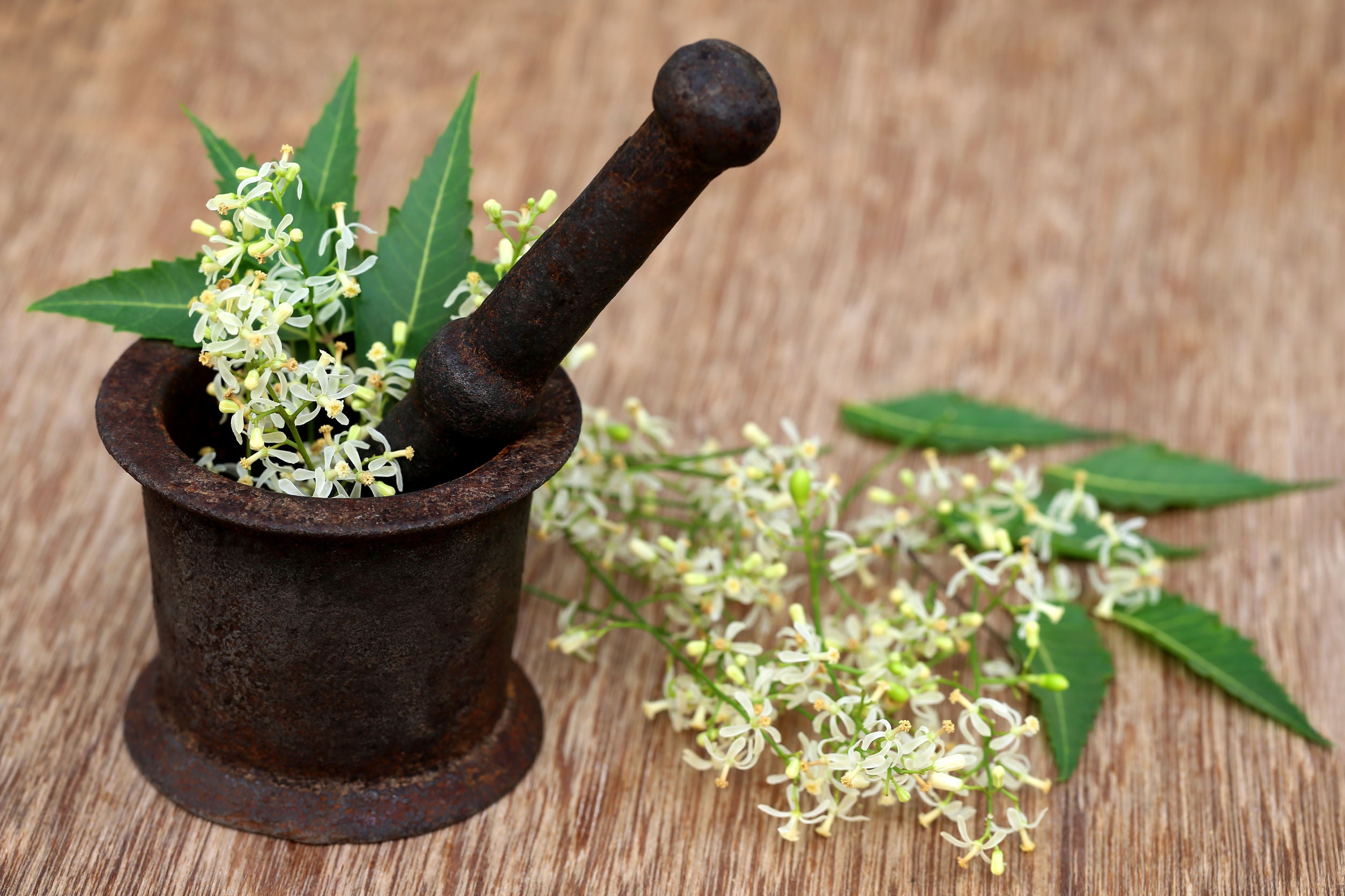Neem. It's an Ayurvedic powerhouse, used in a variety of treatments from digestive concerns to insect repellent, from coughs and colds to malaria, from treating intestinal parasites to a natural household disinfectant, from acne to serious rashes. As an herbalist, I often hear India's Neem tree likened to America's Dandelion. It's an easy comparison to make; both are prolific and grow like weeds, both have wonderful and diverse medicinal properties, neither really gets the attention they deserve, and both can be used to make beer! Both plants are classified as alteratives, a class of herb that purifies the blood, aids in bodily detoxification, can be used to disinfect wounds, and helps to break fevers. But that is where the comparison ends. Dandelion works more closely with the liver and kidneys, aiding the body's natural filtering systems. Neem takes a primary defensive line from the intestines, where 75% of the immune system lives. It's one of the most powerful blood-purifiers and detoxificants in Ayurvedic pharmacology, and is used when treating fungal, bacterial, or inflammatory conditions. It's a common recommendation for clearing parasites out of the intestinal tract and is used for short term microflora resets.
As science delves deeper into the myriad of bacteria that live in our guts, the good ones, the bad ones, and the ugly ones, we gain a clearer picture of how these bacteria, the microflora of our bodies, shapes our general well-being. Our gut biomes are responsible for our metabolisms, our immune systems, and play a large role in our body's ability to transform food into energy. Neem's anti-inflammatory prowess and disinfectant qualities are used in short, 2-4 week spurts to clear out harmful bacteria and parasites in the intestinal tract, giving the body a gut-biome reset. However, usage of neem should always be done in shorter spurts, as it can have a negative impact on the healthy gut bacteria if taken over a prolonged amount of time.
While neem works primarily in the intestinal tract, it partners with the liver and kidney in the same way dandelion does, powering the body's natural filtration systems and generally Taking Care of Business in a fashion that would leave Randy Bachman proud. Thanks to neem's blood-purifying super powers, it's able to impact every part of the body where blood flows- including the respiratory system. It reduces mucus and assists in opening the airways. It has also been used to help treat cardiovascular diseases.
In India, all parts of the neem plant are used. In the days of yore, thin neem branches were used as tooth brushes. The wood was chewed, and the fibers broke down, working much the way a standard toothbrush works, brushing away plaque. The antibacterial and anti-inflammatory properties reduced gingivitis and promoted good oral health, and neem can often be found as an ingredient in natural oral hygiene products. Tea made from the leaves is used to wash away infection and irritation of many kinds- cuts and wounds in the skin, a wash for irritated eyes, a medicated water for acne; one could think of it as India's traditional version of Neosporin.
Neem leaves and branches are famous for their distinct, pervasive, unpleasant smell, but the flowers of the neem plant are sweet and reminiscent of Jasmine flowers. The flowers are used in cooking rice and lentil dishes, as when ingested they carry similar digestive benefits to the leaves. Alcohol based extracts of neem flowers have also been used as an oral contraceptive (although please don't use this as a primary form of birth control). Pregnant women should use caution when taking neem, as a high dosage can, in some cases, cause a miscarriage.
The oil, extracted from the seeds, is the strongest smelling of them all, and is commonly used to treat skin concerns. Neem soap is highly recommended for individuals dealing with various types of dermatitis, and is also wonderful for individuals in the trades. If you're doing outdoor work, neem is an excellent insect repellant, and using it as a soap gets the plant into your skin without oil residue. If you're working in a factory or mechanical setting, exposed to harsh chemicals and solvents that consistently end up on your hands, neem cleans and disinfects, plus boosts your immune system so the negative impact of said chemicals is reduced.
The neem plant is a true gift from Mother Nature, sharing its wealth of benefits everywhere it goes. It's the kind of plant you can call on to fix what ails you, much in the same way you'd call a handyman. However, when taking neem internally, use caution with the dosage and duration. Neem is a powerful plant, and is not recommended for the very old or the very young, and it can have adverse impacts if taken in too high a dose or for too long. Please consult a professional if you have specific concerns around taking neem. Extensive topical usage for skin, hair, and oral health is not cause for concern.
Neem is one of the primary active ingredients in Vedic Botanicals' Easy Breathe Balm, Bite Relief, and Skin Soothe.
About the Author: Rachel Warnock holds a Master's Degree in Ayurvedic Medicine from Maharishi International University and is the Lead Herbalist at Vedic Botanicals. She has 10 years of experience mixing herbs and working with individuals to meet their health and wellness goals, specializing in neurological and dermatological wellness.





